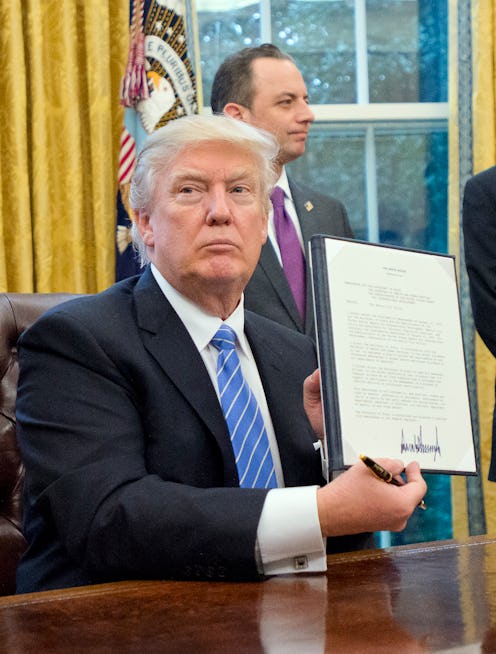News
Trump's Subtle But Damaging Global Gag Rule Update

It should be clear from the recent news that President Donald Trump's reinstatement of the Mexico City Policy will hurt women around the globe. However, with the release Monday night of Trump's memorandum regarding the policy, it has quickly become clear that we may have entered uncharted territory in damage to women's health.
Also known as the Global Gag Rule, the policy, first enacted in 1984 by Ronald Reagan, serves to restrict funding to women's health services provided by international non-governmental organizations (NGOs). The policy bars that any organization that intersects with abortion services — be that providing abortions using privately-raised funds, offering abortion referrals and counseling, or even merely having a pamphlet in their clinic with information on abortion — from receiving federal aid funding.
Previously, the policy has addressed restrictions on "family planning assistance" funds. However, Trump's iteration of the policy has been written to include "global health assistance" funds. Additionally, rather than just being addressed to the Secretary of State and the administrator of USAID, Trump's memorandum also calls on the Secretary of Health and Human Services to carry out the policy.
Sure, you could write these differences off as purely semantics, but that would downplay the additional $8.4 billion dollars that are now potentially subject to restrictions because of the difference of a few words, according to Jonathan Rucks, director of advocacy at PAI, an global advocacy group focusing on women's and reproductive rights.
"This is unprecedented, it's unusual. Frankly, it's cruel," Rucks tells Bustle. "This is ... nearly 15 times more funding that is being implicated by Trump's global gag rule, and then expand that out to the millions more women and families that will be implicated."
Rucks says that when just referring to the family planning assistance funds, the Global Gag Rule affects about $607 million in funding. But when you attach the entire global healthcare budget, that number skyrockets to about $9 billion.
And with the addition of the influence of the Department of Health and Human Services, the Global Gag Rule will now have authority over funds controlled by the Center of Disease Control, the National Institutes of Health, and the Food and Drug Administration.
"When you talk about all of the countries that receive U.S. global health assistance, you're looking at 60 countries," Rucks says. "And that's also a phenomenal amount of implementers now who are going to have to comply this expanded gag rule."
Bustle reached out to the White House for comment, but has not received a response.
What does this mean to somebody who is depending on antiretroviral drugs, if the long-standing partner that they trusted to provide the services is no longer there.
Rucks said that during the last period when the Mexico City Policy was enacted, healthcare organizations suffered immensely. International Planned Parenthood Federation (IPPF), which had been a long-standing healthcare provider in countries around the globe, refused to sign on to the gag rule. Budgets shrank, staff was laid off and services suffered, according to Rucks.
"There was a domino effect," says Rucks. "It really had a negative impact on healthcare referral network. And people who relied on providers, just like people who currently rely on providers that are going to impacted, are going to have a real hard time accessing services."
Rucks said the damage could be even more substantial this time around, because these organizations have made so much progress in the last eight years. There's so much more to rollback with the loss of funding now.
I think that this is consistent with the position of this Trump-Pence administration, and they really see this as a further way to stifle women's autonomy by attacking women's health.
Proponents of the Global Gag Rule insist that there are other qualified organizations that can handle the workload, but Rucks says that is far from true. He said that in some of the regions where long-standing organizations like IPPF or Marie Stopes International work, it is not easy to get new organizations in. Additionally, even if new groups can take over, it wouldn't be a seamless transition, Rucks adds.
"I think we just have to think about what this means to those individuals." he says. "What does this mean to somebody who is depending on antiretroviral drugs, if the long-standing partner who they trusted to provide the services is no longer there?"
In enforcing and expanding this policy, which is an imposing force on even non-governmental funds, Rucks says that the Trump administration has made very clear where its priorities lie.
"I think that this is consistent with the position of this Trump-Pence administration," says Rucks, "and they really see this as a further way to stifle women's autonomy by attacking women's health."